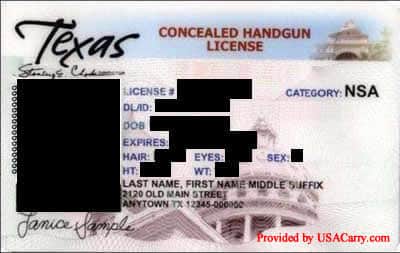This is a summary of Texas concealed carry and firearm laws. We break them down into a question and answer format to make it easier to understand for those of us that aren’t lawyers.
Texas is a Permitless Carry or Constitutional Carry state, which means as long as you meet the following requirements, you can carry a handgun concealed or open in a holster without needing a Texas Concealed Handgun License.
- at least 21 years old
- can legally possess a firearm
- have not been convicted within the past five years of misdemeanor bodily assault causing injury, deadly conduct, terroristic threat, or disorderly conduct (display or discharge) of a firearm
I still recommend getting a concealed carry license which allows you to carry concealed in many other states. For a complete list, go to our concealed carry map.
Table of Contents:
- States That Honor Texas Concealed Carry Licenses (Residents Only)
- Texas Concealed Carry License Example
- How to Get Your Texas Concealed Handgun License
- Latest Defensive Gun Uses in Texas
- Texas Concealed Carry License Information & FAQs
- Have a Question?
- Changelog
- Go To Another State’s Concealed Carry Page
- Disclaimer
Texas Concealed Carry At A Glance:
- Constitutional Carry | Permitless Carry for Residents and Non-Residents
- Texas Concealed Handgun License (CHL, License to Carry, LTC)
- Shall Issue to Residents and Non-Residents
- 18 years of age minimum for Concealed Handgun License
- 21 years of age minimum for Permitless Carry
- Initial Valid for 4 Years | Renewal Valid for 5 Year
- $40 Initial / $40 Renewal*
- Processing Time within 60 Days*
- Texas Honors 43 States
- 35 States Honor Texas
- State Population: 30,503,301
- Active Licenses: 1,610,125 (As of 12/31/2023)
States That Honor Texas Concealed Carry Licenses (Residents Only)
Texas Concealed Carry License Example

How to Get Your Texas Concealed Handgun License
Time needed: 7 hours
Obtaining a Texas Concealed Handgun License (CHL) involves several important steps, from taking a certified class to submitting necessary documents and completing fingerprinting. Follow this guide to navigate the process smoothly and efficiently.
- Step 1: Take a Texas CHL Class
Applicants are required to complete four to six hours of classroom training as well as pass a written exam and a shooting proficiency qualification. The class must be conducted in Texas by a Texas LTC instructor that is certified by the Department of Public Safety.
- Step 2: Check for Discounts
See if you qualify for any discounts by checking the Texas Concealed Handgun License Fee Schedule.
- Step 3: Apply Online
For the fastest processing time, use the secure online application form.
- Step 4: Submit Supporting Documents
Submit all supporting documents through the secure online form.
- Step 5: Schedule Fingerprinting
After you have submitted your application online, you can schedule your fingerprinting through IdentoGO.
Latest Defensive Gun Uses in Texas
Texas Concealed Carry License Information & FAQs
Texas is a Shall Issue State and issues Concealed Handgun Licenses to residents of Texas and non-residents.
Applicants can apply online or fill out the downloadable forms and mail them in. Some instructors may provide you with your forms. All forms should be mailed to:
Regulatory Services Division
Concealed Handgun – MSC 0245
P.O. Box 15888
Austin, Texas 78761-5888
Once your application has been processed, you must schedule fingerprinting at an IdentoGO center.
Non-residents must successfully complete the required training in the state of Texas. Non-residents must also submit form LTC-6, two passport style photos and a copy of their out of state driver license or state issued identification card.
Texas’ concealed handgun licenses law went into effect in 1995, making them a Shall Issue state.
Yes, Texas has Constitutional Carry, also known as Permitless Carry, which went into effect on September 1, 2021, under House Bill 1927. This law allows both residents and non-residents who meet specific criteria to carry a handgun without a license. The requirements include:
– Being at least 21 years old
– Not being prohibited by state or federal law from possessing a firearm
– Not having a prior conviction for certain offenses, such as assault or domestic violence
By meeting these conditions, individuals can legally carry a handgun openly or concealed without needing a Texas Concealed Handgun License.
License Applications for 18-to-20-Year-Olds
A recent ruling by the United States District Court for the Northern District of Texas allows law-abiding 18-to-20-year-olds to apply for a Texas concealed carry license. This ruling does not affect Constitutional Carry but permits younger individuals to obtain a license if they meet the necessary criteria, ensuring they can carry a handgun for self-defense outside the home.
Texas Concealed Handgun Licenses are issued by the Texas Department of Public Safety. You can visit the Texas Concealed Handgun Licensing website here.
A person is eligible for a Texas Concealed Handgun Permit license if the person:
– is a legal resident of this state for the six-month period preceding the date of the application under this subchapter or is otherwise eligible for a license under Section 411.173(a);
– is at least 21 years of age; or at least 18 if you are a member or veteran of the US Armed Forces, Reserves or National Guard or was discharged under honorable conditions.
– has not been convicted of a felony;
– is not charged with the commission of a Class A or Class B misdemeanor or equivalent offense, or of an offense under Section 42.01, Penal Code, or equivalent offense, or of a felony under an information or indictment;
– is not a fugitive from justice for a felony or a Class A or Class B misdemeanor or equivalent offense;
– is not a chemically dependent person;
– is not incapable of exercising sound judgment with respect to the proper use and storage of a handgun;
has not, in the five years preceding the date of application, been convicted of a Class A or Class B misdemeanor or equivalent offense or of an offense under Section 42.01, Penal Code, or equivalent offense;
– is fully qualified under applicable federal and state law to purchase a handgun;
– has not been finally determined to be delinquent in making a child support payment administered or collected by the attorney general;
– has not been finally determined to be delinquent in the payment of a tax or other money collected by the comptroller, the tax collector of a political subdivision of the state, or any agency or subdivision of the state;
– is not currently restricted under a court protective order or subject to a restraining order affecting the spousal relationship, other than a restraining order solely affecting property interests;
– has not, in the 10 years preceding the date of application, been adjudicated as having engaged in delinquent conduct violating a penal law of the grade of felony; and
– has not made any material misrepresentation, or failed to disclose any material fact, in an application submitted pursuant to Section 411.174.
The cost for an initial or renewal Texas Concealed Handgun Permit is $40. View the complete Texas Concealed Handgun License Fee Schedule for other discounted rates.
Initial Texas Concealed Handgun Licenses expire on the first birthday of the applicant, occurring after the fourth anniversary of the date it was issued.
A renewal license expires on the birthday of the applicant fives years after the date of expiration of the previous license.
A duplicate or modified license expires on the date the license that was duplicated would have expired.
The processing time for a Texas Concealed Handgun License is generally within 60 days after the Texas Department of Public Safety (DPS) receives the completed application materials. If the application is approved, the license will be issued within this timeframe. If the application is denied, the applicant will be notified in writing of the specific reasons for denial. In some cases, if the DPS needs more time to make a determination, they will notify the applicant and provide an estimated additional period required to process the application.
Yes, background checks are required for obtaining a Texas Concealed Handgun License (CHL). The Texas Department of Public Safety (DPS) conducts a thorough background check as part of the application process, which includes fingerprinting and checks through both state and FBI databases. This process involves using the National Instant Criminal Background Check System (NICS) to ensure that applicants meet all state and federal eligibility requirements. This ensures that only eligible individuals receive a concealed handgun license, promoting safety and compliance with legal standards.
Yes. Having a Texas concealed carry license does exempt you from a National Instant Criminal System (NICS) check when purchasing a firearm according to the ATF Permanent Brady Permit Chart. There is a checkbox on the 4473 form that the FFL can check that states no NICS is required.
Yes, military training can exempt you from certain training requirements when applying for a Texas Concealed Handgun License (CHL). According to Texas statutes, individuals currently serving in or honorably discharged from the U.S. military (Army, Navy, Air Force, Coast Guard, Marine Corps, or their reserve units) or the Texas military forces are exempt from completing the range instruction portion of the handgun proficiency course if they have completed a course of training in firearm proficiency or a range qualification process within the preceding 10 years.
Documentation Requirements
Active Military
Forms to Submit: LTC-100 or LTC-101 (Classroom training only) and Military range scores or proof of firearm training within the last 10 years.
Fingerprints: Required
Additional Requirements: Must submit a copy of Military ID and one of the following:
– Current Leave and Earning Statement (LES)
– Current Orders
– Letter from Commanding Officer
– DD-214 (Honorable or Under Honorable discharge within 365 days of separation date)
Fee: New: $0, Renewal: $0
Active Texas Military
Forms to Submit: Same as Active Military
Fingerprints: Required
Additional Requirements: Same as Active Military
Fee: New: $0, Renewal: $0
Veteran (Honorably Discharged)
Forms to Submit: Same as Active Military
Fingerprints: Required
Additional Requirements: Must submit a copy of one of the following:
– DD-214 (Honorable or Under Honorable discharge)
– Military ID stating “indef.” or “retired” or “reserve retired”
– Honorable Discharge Certificate
– Veterans Affairs (VA) letter stating “Honorable”
Fee: New: $25, Renewal: $25
This exemption streamlines the licensing process for military personnel and veterans, recognizing their existing firearm proficiency.
To renew your Texas Concealed Handgun License (LTC), follow these steps:
1. Complete a Handgun Proficiency Course:
– First or Second Renewal: Complete the course within 6 months preceding the date of application renewal.
– Third or Subsequent Renewals: Complete the course within 6 months preceding the date of application for renewal or the preceding renewal to ensure it’s done once in any 10-year period.
2. Submit Renewal Application:
– Online: You can submit your renewal application through the License To Carry A Handgun online portal.
– By Mail: Download the forms, fill them out, and mail them to:
Texas Department of Public Safety
Concealed Handgun – MSC 0245
PO Box 4087
Austin, TX 78773-0001
3. Use Existing Fingerprints and Photos:
The department will use existing fingerprints and photos on file. If the quality no longer meets State or FBI standards, you will be notified to obtain a new set of prints.
4. Provide Lawful Presence Documentation: Non-U.S. citizens must provide their lawful presence documentation to the Department prior to renewal.
The standard fee for renewing an LTC is $40. However, discounts are available for certain conditions, and a complete list of fees and special conditions can be found on the fee table.
To change your name or address on a Texas Concealed Handgun License (LTC), follow these steps:
Changing Your Address: You can update your address through the Texas Department of Public Safety’s online portal at Texas LTC Online.
Ensure you complete this update within 30 days of the change.
Changing Your Name:
– Notify the Texas Department of Public Safety (DPS) within 30 days of your name change.
– Fill out the Name Change Form (LTC-70) with your former and new names and other required details.
– Submit the completed form to the DPS.
General Steps for Both Name and Address Changes:
Apply for a Duplicate License: You are required to apply for a duplicate license to reflect the updated information. The duplicate license will include your current name and/or residence address. The fee for a duplicate license is $25.
Submission of Required Information: Provide your license number and the relevant updated information (former and new addresses or names).
Local Law Enforcement Notification: Upon request from local law enforcement, the DPS will notify them of any changes made by license holders residing in the county.
By following these steps, you can ensure your Texas Concealed Handgun License information is kept current and accurate. For more detailed information and access to necessary forms, visit the Texas DPS Handgun Licensing page.
If your Texas Concealed Handgun License (LTC) is lost, stolen, or damaged, follow these steps to obtain a duplicate license:
Report and Apply for a Duplicate License:
You must apply for a duplicate license within 30 days of the loss, theft, or destruction of your original license.
Complete the application for a duplicate license using the Texas Department of Public Safety (DPS) online portal.
Fee for Duplicate License:
Pay the required fee of $25 for the duplicate license.
Submission of Required Information:
Provide your license number and any necessary supporting information as requested by the DPS.
Renewal Option:
If your license is set to expire within 60 days of the date of loss, theft, or destruction, you may choose to renew your license with the updated information. In this case, you only need to pay the renewal fee instead of the duplicate license fee.
By promptly applying for a duplicate license, you ensure that your Texas Concealed Handgun License remains valid and you stay compliant with state regulations. For more detailed information and access to the necessary forms, visit the Texas DPS Handgun Licensing page.
No, you cannot directly transfer a concealed carry license from another state to Texas. However, Texas does recognize concealed carry permits from many other states through reciprocity agreements. This means that if you hold a valid concealed carry license from a state that Texas recognizes, you can legally carry a concealed handgun in Texas under that permit.
If you move to Texas and want a Texas License to Carry (LTC), you must apply for one.
Texas accepts 43 other state permits or licenses. Texas has a specific list of states they have reciprocity with and will honor non-resident permits/licenses from those states. To see the most up-to-date reciprocity information visit our concealed carry reciprocity maps.
Also, only Rhode Island permits issued by the Attorney General are honored by Texas. Permits issued by Rhode Island Local Officials are not honored.
Yes, 35 other states recognize or honor Texas Concealed Handgun Licenses. These states include:
– Alabama
– Alaska
– Arizona
– Arkansas
– Colorado
– Delaware
– Florida
– Georgia
– Idaho
– Indiana
– Iowa
– Kansas
– Kentucky
– Louisiana
– Michigan
– Mississippi
– Missouri
– Montana
– Nebraska
– Nevada
– New Mexico
– North Carolina
– North Dakota
– Ohio
– Oklahoma
– Pennsylvania
– South Carolina
– South Dakota
– Tennessee
– Utah
– Vermont
– Virginia
– West Virginia
– Wisconsin
To see the most up-to-date reciprocity information, please view our concealed carry reciprocity maps.
When carrying in another state, you must adhere to that state’s concealed carry laws.
In Texas, if you are carrying a concealed weapon and are stopped by law enforcement, your obligations depend on whether you have a Texas License to Carry (LTC) or are carrying under the permitless carry law.
For LTC Holders:
Requirement to Display License: If you are carrying a handgun and are asked by a magistrate or peace officer to display identification, you must present both your driver’s license or state-issued identification and your handgun license. This is required under Texas Government Code Sec. 411.205.
Procedure During a Traffic Stop: It is recommended to inform the officer that you have a firearm before being asked, though the primary legal requirement is to provide your LTC when asked for identification if you are carrying a firearm at the time.
For Permitless Carriers:
No Requirement to Inform: Individuals carrying a handgun under the permitless carry law are not legally required to inform law enforcement that they are carrying a firearm unless specifically asked. However, it is generally advisable to do so to avoid misunderstandings.
This information ensures that you comply with Texas law during interactions with law enforcement while carrying a firearm.
Yes, Texas issues Concealed Handgun Licenses (LTC) to resident aliens with a green card, provided they meet the necessary requirements. Both resident aliens and certain nonimmigrant aliens lawfully present in the United States can obtain a Texas LTC, subject to federal firearms laws and other eligibility criteria. Applicants born outside the United States must submit additional documentation, as detailed in the form Notice – Non-Immigrant – Visa.
Anyone traveling in Texas can carry a loaded handgun in their vehicle under certain conditions. Specifically:
Concealed Carry: A concealed, loaded handgun may be carried anywhere in the vehicle by anyone, regardless of whether they have a permit.
Visible Carry: A handgun may be carried visibly in the vehicle, but it must be holstered.
Loaded Long Guns: Loaded long guns (rifles and shotguns) may be carried anywhere in the vehicle, whether concealed or visible.
Restrictions: The person carrying the firearm must not be engaged in any criminal activity, other than a Class C traffic violation, and must not be otherwise prohibited by law from possessing a firearm.
These provisions allow for flexibility in carrying firearms in vehicles while ensuring safety and compliance with Texas laws.
In Texas, there are specific places where carrying a concealed weapon is prohibited, even if you have a permit or license. Here is a comprehensive list of places where you cannot carry a concealed weapon:
Schools and Educational Institutions:
– On the premises of primary or secondary schools.
– On the premises of postsecondary educational institutions.
– In any building or vehicle owned by a school or postsecondary educational institution.
– During any activity sponsored by a school or institution.
Polling Places:
On the premises of a polling place on the day of an election or while early voting is in progress.
Government Courts or Offices:
On the premises of any government court or offices used by the court unless authorized by written regulations or authorization of the court.
Racetracks:
On the premises of a racetrack.
Airports:
In secured areas of an airport.
Places of Execution:
Within 1,000 feet of premises designated for executions on the day a sentence of death is set to be imposed if notice has been given.
Businesses Serving Alcohol:
On the premises of businesses that derive 51% or more of their income from the sale or service of alcoholic beverages for on-premises consumption.
Sporting Events:
On the premises where a high school, collegiate, or professional sporting event or interscholastic event is taking place unless you are a participant in the event and a firearm is used in the event.
Correctional Facilities:
On the premises of any correctional facility.
Civil Commitment Facilities:
On the premises of a civil commitment facility.
Hospitals and Nursing Facilities:
On the premises of a hospital licensed under Chapter 241, Health and Safety Code, or a nursing facility licensed under Chapter 242, Health and Safety Code, unless you have written authorization from the administration.
Mental Hospitals:
On the premises of a mental hospital, as defined by Section 571.003, Health and Safety Code, unless you have written authorization from the administration.
Amusement Parks:
On the premises of an amusement park.
Governmental Meetings:
In the room or rooms where a meeting of a governmental entity is held if the meeting is an open meeting subject to Chapter 551, Government Code, and if the entity provided notice as required by that chapter.
Institutions of Higher Education:
On the premises of an institution of higher education or private or independent institution of higher education.
Public Transportation Vehicles:
In a passenger transportation vehicle of a school or postsecondary educational institution.
These restrictions are based on the Texas Penal Code Sections 46.03 and 46.15, which detail the places where weapons are prohibited. Always ensure you are aware of and comply with the latest regulations to avoid legal issues.
Texas is a state with castle law. You can find the Texas Code at Penal Code Sec. 9.32 which can be broken down as follows:
(a) A person is justified in using deadly force against another:
(1) if the actor would be justified in using force against the other under Section 9.31; and
(2) when and to the degree, the actor reasonably believes the deadly force is immediately necessary:
(A) to protect the actor against the other’s use or attempted use of unlawful deadly force; or
(B) to prevent the other’s imminent commission of aggravated kidnapping, murder, sexual assault, aggravated sexual assault, robbery, or aggravated robbery. (b) The actor’s belief under Subsection (a)(2) that the deadly force was immediately necessary as described by that subdivision is presumed to be reasonable if the actor:
(1) knew or had reason to believe that the person against whom the deadly force was used:
(A) unlawfully and with force entered, or was attempting to enter unlawfully and with force, the actor’s occupied habitation, vehicle, or place of business or employment;
(B) unlawfully and with force removed or was attempting to remove unlawfully and with force, the actor from the actor’s habitation, vehicle, or place of business or employment; or
(C) was committing or attempting to commit an offense described by Subsection (a)(2)(B);
(2) did not provoke the person against whom the force was used; and
(3) was not otherwise engaged in criminal activity, other than a Class C misdemeanor that is a violation of a law or ordinance regulating traffic at the time the force was used. (c) A person who has a right to be present at the location where the deadly force is used, who has not provoked the person against whom the deadly force is used, and who is not engaged in criminal activity at the time the deadly force is used is not required to retreat before using deadly force as described by this section. (d) For purposes of Subsection (a)(2), in determining whether an actor described by Subsection (c) reasonably believed that the use of deadly force was necessary, a finder of fact may not consider whether the actor failed to retreat.
In Texas, you cannot carry a concealed handgun into a bar or any establishment that earns 51% or more of its income from the sale of alcoholic beverages for on-premises consumption. These establishments are required to display a 51% sign indicating the restriction.
However, you may carry a concealed handgun into a restaurant that serves alcohol as long as the establishment earns less than 51% of its income from alcohol sales, and there are no other signs prohibiting firearms.
You must not consume alcoholic liquor, beer, or wine while carrying a concealed weapon. Texas Penal Code §46.035 states it is unlawful for an intoxicated individual to carry a concealed handgun. The Penal Code defines “intoxicated” as not having the normal use of mental or physical faculties by reason of the introduction of alcohol, a controlled substance, a drug, a dangerous drug, a combination of two or more of those substances, or any other substance in the body.
USA Carry always recommends never to carry a firearm while drinking alcohol.
Yes, Texas has specific laws regarding ‘No Firearms Allowed’ signs. Under Texas Penal Code Sections 30.06 and 30.07, property owners can prohibit the carrying of concealed and openly carried handguns on their premises by licensed individuals.
Requirements for ‘No Firearms Allowed’ Signs:
Penal Code 30.06 – Prohibits concealed handguns:
– The sign must include the exact language specified in the statute, in both English and Spanish.
– The text must be in contrasting colors with block letters at least one inch in height.
– The sign must be displayed in a conspicuous manner clearly visible to the public.
Penal Code 30.07 – Prohibits openly carried handguns:
– Similar to 30.06, the sign must have the specified language in English and Spanish.
– The text must be in contrasting colors with block letters at least one inch in height.
– The sign must be posted at each entrance to the property and be clearly visible.
Enforcement and Penalties:
– Violating these signs is a Class C misdemeanor punishable by a fine up to $200.
– If the license holder receives personal oral notice and fails to leave, it escalates to a Class A misdemeanor.
Additional Sign Requirements:
– Establishments that derive 51% or more of their income from alcohol sales must post a 51% sign indicating that firearms are prohibited.
– Signs for prohibiting unlicensed carry under permitless carry laws do not need to meet the same requirements as those for licensed carry.
You are not required to notify the Department of Public Safety of an arrest or conviction. But they will suspend your license if the license holder:
– is charged with the commission of a Class A or Class B misdemeanor or equivalent offense, or of an offense under Section 42.01, Penal Code, or equivalent offense, or of a felony under an information or indictment;
– fails to notify the department of a change of address, name, or status as required by Section 411.181;
– commits an act of family violence and is the subject of an active protective order rendered under Title 4, Family Code; or
– is arrested for an offense involving family violence or an offense under Section 42.072, Penal Code, and is the subject of an order for emergency protection issued under Article 17.292, Code of Criminal Procedure.
If your license is suspended, you will get a notice in the mail about the suspension. You must then surrender the license within ten days of receiving the notice unless it has already been surrendered or seized as evidence or request a hearing from the department.
Yes, if you move your permanent residence to another state, your Texas Concealed Handgun License (CHL) remains valid. Texas does not require license holders to be residents of the state. However, you must update your address with the Texas Department of Public Safety (DPS) within 30 days of moving. This ensures your contact information is current and that you receive any necessary communications regarding your license. If you plan to carry in your new state, check if it has reciprocity with Texas to honor your Texas CHL.
State Parks: Yes
State Forests: Yes
National Forests: Yes
WMA’s: Yes
Roadside Rest Areas: Yes
Please visit our Texas Open Carry page for more information.
Have a Question?
Do you have a questions about Texas concealed carry that we haven’t answered? Contact us here, and we’ll do our best to find you an answer.
Changelog
- 7/17/2024 – New Page Format and all information checked and updated.
Go To Another State’s Concealed Carry Page
To view a state’s concealed carry permit information click on the state. The state’s color represents whether a state is Shall Issue, May Issue, Constitutional Carry, or Right Denied.
Shall Issue to Residents Only:
California, Colorado, Georgia, Guam, Michigan, New Mexico
Shall Issue to Residents and Non-Residents:
District of Columbia, Illinois, Indiana, Minnesota, Nevada, New Jersey, North Carolina, Ohio, Oregon, Pennsylvania, Puerto Rico, Rhode Island, Virginia, Washington, Wisconsin
May Issue to Residents Only:
Delaware, Virgin Islands
May Issue to Residents and Non-Residents:
Connecticut, Maryland, Massachusetts, New York
Constitutional Carry and Shall Issue to Residents Only:
Alabama, Alaska, Louisiana, Montana, Nebraska, Wyoming
Constitutional Carry and Shall Issue to Residents and Non-Residents:
Arizona, Arkansas, Florida, Hawaii, Idaho, Iowa, Kansas, Kentucky, Maine, Mississippi, Missouri, New Hampshire, North Dakota, Oklahoma, South Carolina, South Dakota, Tennessee, Texas, Utah, West Virginia
Constitutional Carry and Does Not Issue Permits:
Vermont
Right Denied:
American Samoa, N. Mariana Islands
Disclaimer
We try to keep the information on this page as up-to-date as possible, but it is your responsibility to verify all information due to changing laws. The information on this page is for informational purposes only and not to provide legal advice. You should contact your attorney to obtain advice concerning any particular issue or problem. Use of and access to this Website, emails, or any links within the site do not create an attorney-client relationship between USA Carry LLC and the user or browser. The opinions expressed at or through this site are the opinions of the individual author and may not reflect the views of USA Carry LLC.








